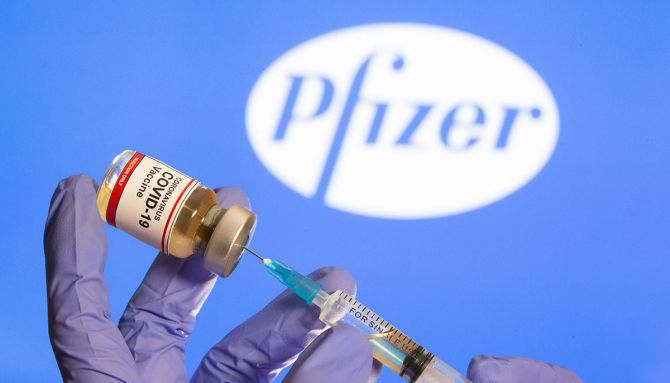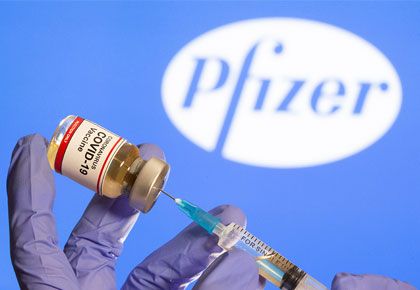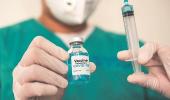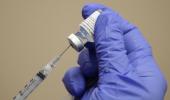At $37 per dose, the Pfizer vaccine is much more expensive compared to $3 per dose for the Covishield.
Sohini Das and Shrimi Choudhary report.

As the Centre starts provisioning for one of the largest immunisation drives in the world, the Pfizer-BioNTech vaccine candidate seems to be an outlier, at least for now.
Senior government officials have indicated that India may not procure the mRNA vaccine, which American major Pfizer and Germany's BioNTech have developed, for the immunisation drive.
The higher cost of the Pfizer vaccine, already approved by the UK and the US regulators, is among the primary reasons why other options may be preferred by India.
At $37 per dose, the Pfizer vaccine is much more expensive compared to $3 per dose for the Covishield, a vaccine developed by Oxford-AstraZeneca and manufactured by the Serum Institute of India.
Even the Russian vaccine Sputnik V is cheaper than Pfizer at $10 per dose.
Indigenous vaccines from Bharat Biotech and Zydus Cadila are expected to be in the range of $3-$6 per dose.
The cost of cold-chain infrastructure to maintain the stringent temperature requirement for the Pfizer vaccine would add to the overall expenditure.
Unlike others, Pfizer would require minus 70 degree Celsius temperature for storage.
According to Bernstein analysts, the Indian government is likely to procure 680 million doses, implying a spend of $1.9 billion for the government, assuming a dose costs $3.
At $37 per dose, the cost would be 12-times more.
If the government chooses to vaccinate the entire population, it would need to set aside $6 billion (at $3 per dose).
When contacted, Pfizer maintained that the company would only sell through government contracts.
So, even if the vaccine gets the regulator's nod here (it has applied for accelerated marketing authorisation), it would not be available in India as the company would not immediately sell in the private market.
While there could be payable service for those who can afford it, the government is committed to injecting any amount of funds required for vaccination, according to an official in the finance ministry.
Without giving any specific amount, the official indicated that the Budget will have significant provisioning for the vaccination drive, ranging from procurement to logistics.
"There has been a lot of deliberation on whether the Pfizer shots would be accommodative for the Indian population given its high pricing and the public health infrastructure. It is not favourable for the national programme as they are expensive and need a sub-zero storage condition," said a senior government official privy to the development.
Meanwhile, sources close to the development indicate that the Subject Expert Committee, that is advising the drug regulator on vaccine approvals, is keen to have at least 1,600-2,000 people Indian data as the Pfizer vaccine is based on completely new technology.
That would mean Pfizer would need to conduct bridge trials in India to show safety and immunogenicity on Indians.
It has sought a waiver from clinical trials in India and applied for approval based on global data.
According to documents published by the US Food and Drug Administration, only 4.3 per cent of global trial participants were Asian.
Efficacy rate for the ethnic group was 74.4 per cent in comparison to an overall efficacy of 95.5 per cent that comprised 83 per cent whites.
Pfizer did not comment on how many Indians were part of global trials and whether it was willing to conduct trials here if the regulator sought.
Pfizer would have the option to sell in the private market if it chooses to once it gets a nod from the regulator here.
If the company conducts a clinical trial here, then the approval process would be pushed back by at least three to five months.
As for funds for the vaccination drive, the government official quoted above said the initial requirements would be fulfilled by the Budget allocation of the current fiscal made to the Department of Health and Family Welfare.
In FY21, the government had allocated Rs 65,012 crore to the health department.
During the April-October period, the department had spent around Rs 44,000 crore.
For meeting additional expenditure, grants-in-aid for containment of Covid-19 pandemic is Rs 6,852 crore.
India needs roughly 60 million doses in phase-1 to vaccinate 30 million priority list people.
This can come from Serum Institute as it has a stockpile of 50 million doses and has applied for marketing approval.
Serum has also submitted data from the Indian arm of trials along with the global clinical trial data.
Feature Presentation: Ashish Narsale/ Rediff.com












